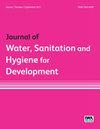印度尼西亚城市自给源的季节性与粪便污染之间的关系
IF 1.4
4区 环境科学与生态学
Q3 WATER RESOURCES
Journal of Water Sanitation and Hygiene for Development
Pub Date : 2023-09-13
DOI:10.2166/washdev.2023.060
引用次数: 0
摘要
考虑季节变化的水质监测对于确保任何时候的安全供水服务至关重要,包括为印度尼西亚城市4000多万人提供饮用水的地下水自供。在印度尼西亚和其他地方,自供水质的季节性变化仍然是一个关键的证据缺口;因此,本研究调查了印度尼西亚勿加西市和麦德龙市地下水自供的季节性和粪便污染之间的关系。该研究在季节性和微生物水质之间的关系方面证明了不同的结果。McNemar检验结果显示,贝卡西地区雨季出现高浓度大肠杆菌(≥100 MPN / 100 mL)的可能性显著高于旱季(p = 0.050),而Metro地区没有出现高浓度大肠杆菌(p = 0.694)。在两个研究地点,季节与自供源中大肠杆菌的存在没有统计学意义上的显著关联,季节与使用点中高浓度大肠杆菌的存在也没有统计学意义上的显著关联。在这两个研究地点,在旱季大肠杆菌的存在和高浓度显著增加了雨季污染的风险,但预测能力较弱。定期进行水质测试,并辅以卫生检查,以了解自供水源的污染风险。本文章由计算机程序翻译,如有差异,请以英文原文为准。
Associations between seasonality and faecal contamination of self-supply sources in urban Indonesia
Abstract Water quality monitoring that accounts for seasonal variability is crucial to ensure safe water services at all times, including groundwater self-supply, which provides drinking water for more than 40 million people in urban Indonesia. Seasonal variation of self-supply water quality remains a key evidence gap in Indonesia and elsewhere; therefore, this study investigated the associations between seasonality and faecal contamination of groundwater self-supply in the Indonesian cities of Bekasi and Metro. The study demonstrated mixed results in terms of associations between seasonality and microbial water quality. McNemar's test showed that high concentrations of Escherichia coli (E. coli) (≥100 MPN per 100 mL) were significantly more likely during the wet season than during the dry season in Bekasi (p = 0.050), but not in Metro (p = 0.694). There was no statistically significant association between the season and the presence of E. coli in self-supply sources for both study sites, nor was there a significant association between the season and the presence of high concentrations of E. coli at the point-of-use. At both study sites, presence and high concentrations of E. coli during the dry season significantly increased the risk of contamination in the wet season, but the predictive power was weak. Regular water quality testing complemented by sanitary inspection is required to understand the contamination risks of self-supply sources.
求助全文
通过发布文献求助,成功后即可免费获取论文全文。
去求助
来源期刊

Journal of Water Sanitation and Hygiene for Development
WATER RESOURCES-
CiteScore
3.10
自引率
11.80%
发文量
58
审稿时长
16 weeks
期刊介绍:
The Journal of Water, Sanitation and Hygiene for Development is a peer-reviewed journal devoted to the dissemination of high-quality information on the science, policy and practice of drinking-water supply, sanitation and hygiene at local, national and international levels.
 求助内容:
求助内容: 应助结果提醒方式:
应助结果提醒方式:


